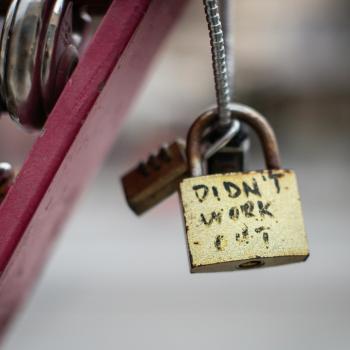
Image by beauty_of_nature from Pixabay
From the outside, my marriage looked fine. We didn’t fight or scream, curse at, or abuse each other. For the most part, we were kind and at ease in our marriage, but I felt stuck in a dull, passionless routine resulting in indifference. According to Forbes, 75% of individuals and couples cited lack of commitment as the reason for their divorce. When we grow comfortable, we can become complacent, leading to mediocrity, often resulting in relational breakdown.
My wife and I slept in separate rooms and beds for many years, functioning more like married singles (i.e., roommates with benefits). Regrettably, our marriage and love life became predictable and routine. We also didn’t have any close mutual friends, and we enjoyed very few meaningful activities together.
Sadly, if it weren’t for the joy my children and grandkids brought me, our marriage would have ended before it did. And in my heart, it was over long before it was legally over.
Marriage and love require work, but I stopped putting in the necessary effort somewhere along the way. As Ann Voskamp wrote in WayMaker, “Marriage’s drift not because there is increasing conflict and anger but because there is increasing distance and decreasing attachment.” She also wrote, “(If you) keep burying how you feel, you’ll end up digging your relationships a pretty big grave.”
I didn’t and don’t hate the wife of my youth. I hold no animosity in my heart toward her. I did and still do respect her in many ways. She is an incredible mother and grandmother, and we had a good marriage for many years. Unfortunately, however, I no longer felt a passionate and deep attachment or connection. Our relationship became safe, comfortable, and monotonous. And I’ve never done any of those things very well.
So, for quite some time, and I’m embarrassed to confess this, I engaged in unholy and risky behaviors that, if they’d come to light, those activities would have blown up my ministry and my marriage long before I signed the divorce papers. I was a wreck. Tragically, because of my sins, I suffered from depression, hopelessness, and a longing to die. I wasn’t suicidal, but I told God through tears on many occasions that He could take me home any time.
The demise of my marriage didn’t happen overnight. Long before Katherine (my wife now) became a part of my life, I gave up on my first marriage and was faking it. Despite how others may have perceived it, in my heart, my relationship with my ex was over for years. So, Katherine is not responsible for what happened in my previous marriage. I am.
Please read this next part slowly. (In other words, stop skimming and pay close attention.) My spiritual and emotional brokenness is not an excuse for my shameful behavior.
I am not blaming my choices on anything or anyone else.
- I should have risen above my circumstances.
- I should have persevered and practiced what I preached.
- I should have sought out counsel.
- I shouldn’t have faked it with the hope of making it.
- I was lonely, depressed, exhausted, hurting, and a miserable mess, but my biggest failure was hiding my brokenness.
I failed. I quit. My ex is not without culpability, but as the husband and leader in our home, I was primarily to blame for the destruction of my first marriage. And despite accusations to the contrary, I know what I did and the damage I caused. Because I hurt them, half of my children and most my former friends have shunned me since my divorce. The impact of my failures is enormously painful. No matter what the reason, there is a high cost to marital failure.
Brennan Manning once wrote, “The betrayals and infidelities in my life are too numerous to count.” More times than I care to remember, through my sins, I cast everything from small pebbles to massive boulders into the calm waters of people’s lives.
Not too long ago, I threw a good-sized stone into a pond near my home. Before my pebble-throwing disturbance, everything was quiet, and the water was calm as it reflected the trees and the clouds above it. But my rock wreaked havoc on that little pond. After a few minutes, however, the water returned to its serene and peaceful state.
As I knelt to pick up another flat rock to skip on the surface, the Lord spoke to my heart, “It takes time for the water to settle.” What I am learning—and it is a painful lesson for a man not known for patience, is that it takes time for the waters of a relationship to settle. Hopefully, my most valued relationships will be restored someday, but I know I threw the painful stones. So, I must wait in humility and patience. And I must trust that God is working below the surface of what I can see to bring healing.
But failure is not the end of my story…
When you are lost and buried in guilt and shame and when your body, heart, and soul are weak, exhausted, and broken, the best thing you can do is look to the One who renews all things. He is committed to making us new no matter what we’ve done or how badly we’ve failed.
I love this quote by Laura Bennett: “Having God as our Father means we’re never without an opportunity to start over. No matter how damaged or broken you are, God is well able to create purity in the broken and restore strength to anyone.”
In David’s second most famous Psalm, he cried, “Mighty and great one who knows all and is above all, I am desperate again for your unmerited kindness and mercy. Not because of who I am, but because of who you are—a compassionate redeemer who loves the unlovely. Please remove the ugly stain of my sins” (Psalm 51:1, Bubna Paraphrase).
Many times, in the months that followed my divorce, I grieved and wept. Many times, the weight and consequences of my choices crushed me. I wrote about how devastating my divorce was in this article. People I once was close to abandoned me as “lost,” and they rejected me like an unclean leper.
Yet, through tears, I remembered David’s words in Psalm 51: 16-17 (TPT): “For the source of your pleasure is not in my performance or the burnt offerings and sacrifices I might offer to you. The fountain of your pleasure is found in the sacrifice of my shattered heart before you. You will not despise by tenderness as I humbly bow down at your feet.”
Penance is not required.
Some people, mostly works-driven Christians, will want “sacrifice and burnt offerings” from you on the backside of your failure. And the idea of you doing anything of value for Jesus now or in the future turns their stomachs. They will want to see you pay for your sins, and they love to quote, “You reap what you sow, brother” (Galatians 6:7-9).
Much like a person who goes to a priest who tells him to do five “Hail Marys” and two “Our Fathers,” and then their sins will be forgiven. Penance and suffering are seen as payment. But God does not ask that of us. All God is looking for is a broken and contrite heart.
Certainly, if you sow sin and remain unrepentant, you will unquestionably reap the consequences of those wrong choices. Of course, there is a place for restitution and reparation when necessary and able to do so. But you never need to pay for your sins because Jesus fully paid your debt (and mine).
Thankfully, Abba is merciful (i.e., we don’t always reap what we sow), and He gladly accepts any heart crushed because of sin. Jesus never turns His back on any broken leper. No one knows better than I do that the cost of relationship failure is often high, but with God in the mix, anything is possible because restoration is His specialty. So, don’t give up. Don’t lose hope. Give God time to “settle the waters.”
You can find out more about Kurt Bubna and his writing on Twitter and Facebook. You can read more about his views and insights, both in his books and on his website.













